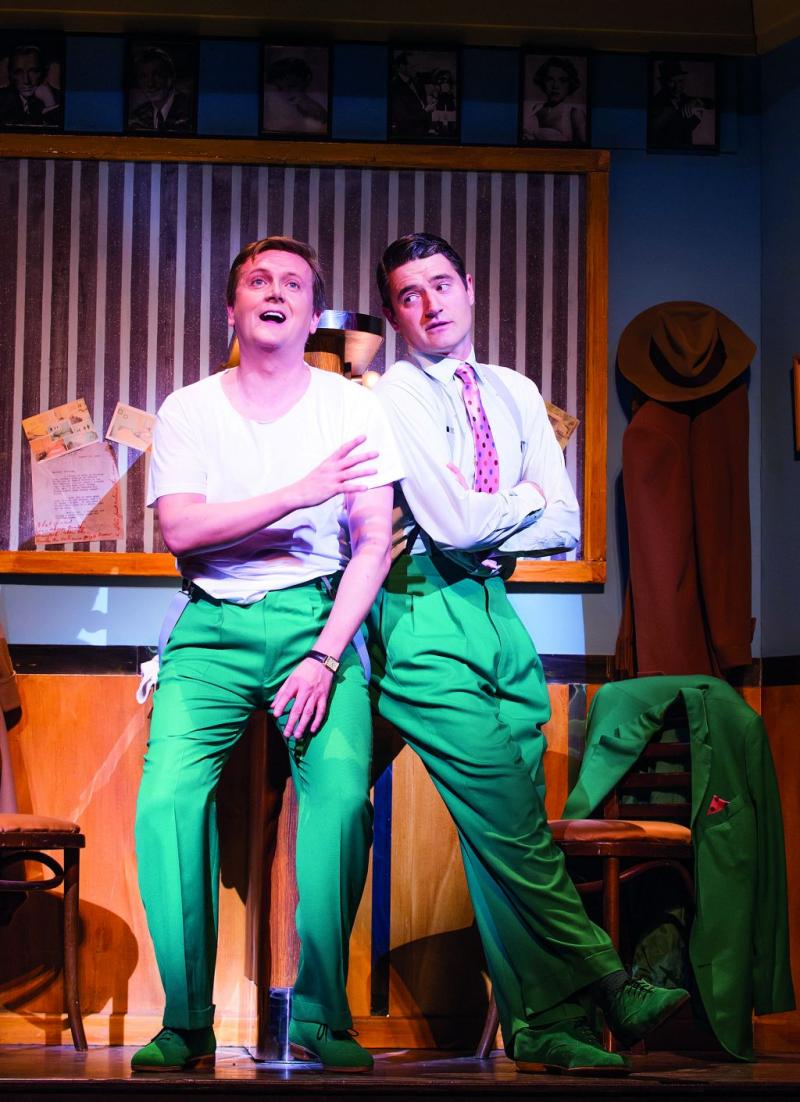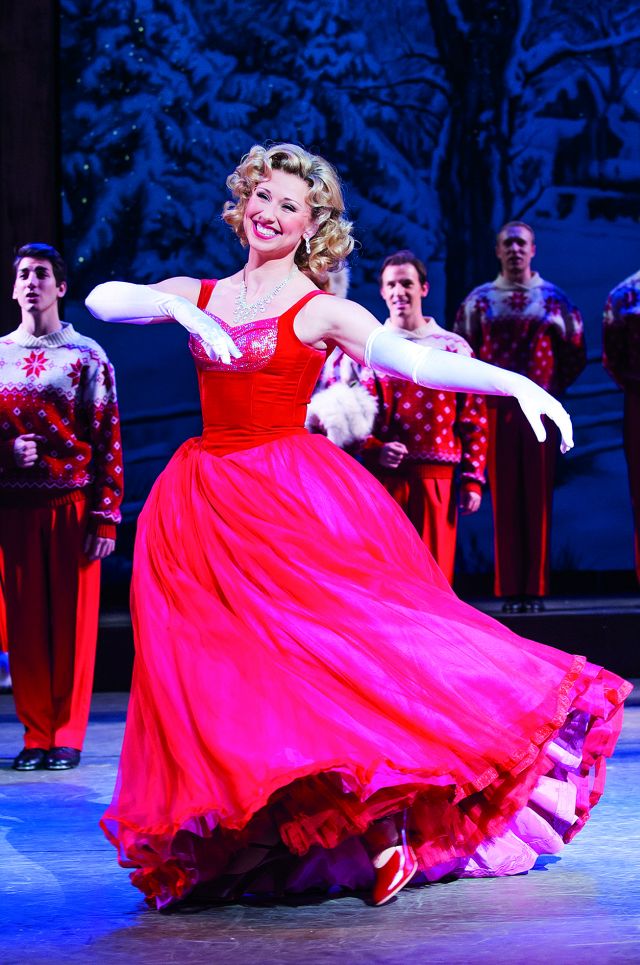White Christmas, Dominion Theatre | reviews, news & interviews
White Christmas, Dominion Theatre
White Christmas, Dominion Theatre
Latest film-turned-stage-musical should ask Santa for some charm

What ought to be a featherweight holiday confection emerges as a charmless slog in the belated West End bow of White Christmas, a title that at this point in November may induce panic in those playgoers who haven't begun to think about holiday shopping.
The 1954 Michael Curtiz film benefitted, of course, from Bing Crosby and Danny Kaye in roles here taken by Aled Jones and Tom Chambers, but the problem has less to do with the current duo displacing memories of their celluloid forbears (or not, as the case may be) and more to do with a star quality that simply isn't there - an absence amplified in a playhouse as large as the Dominion that needs some kind of wattage simply to charge up the space.
 Things could be worse, I suppose: Morgan Young's blandly efficient production isn't blighted with the likes of Marti Pellow, whose Che in this playhouse's previous tenant, Evita, remains a misfire of an order that will not soon be forgotten. But all the spit and polish of Randy Skinner's dance routines - matched in visual terms by Broadway veteran Anna Louizos's understatedly lovely sets - can't revivify a stolid affair that springs briefly to life at the start of the second act only to settle back into grin-and-bear-it mode.
Things could be worse, I suppose: Morgan Young's blandly efficient production isn't blighted with the likes of Marti Pellow, whose Che in this playhouse's previous tenant, Evita, remains a misfire of an order that will not soon be forgotten. But all the spit and polish of Randy Skinner's dance routines - matched in visual terms by Broadway veteran Anna Louizos's understatedly lovely sets - can't revivify a stolid affair that springs briefly to life at the start of the second act only to settle back into grin-and-bear-it mode.
You'll doubtless know the story: two army pals, Bob Wallace (Jones) and Phil Davis (Chambers), segue from troop-side entertaining in wartime to a career that ten years later finds the pair guesting on the Ed Sullivan show and wooing two sisters all the way to a Vermont ski lodge. That snowy idyll - or maybe not, given the downturn in business - just so happens to be run by a wrung-out version of the same general for whom the men made a (literal) song and dance during the war, the hostelry presided over by an apparent Ethel Merman wannabe called Martha "the megaphone" Watson (the show's phrase, not mine). In that role, Wendi Peters (pictured above), hair piled high in the style of the Merm, certainly has the lung power to invite comparison if not the easeful wit or sass.
Romantic complications ensue when a big deal is made out of what Bob intended as a "little kiss", and it looks for a while as if the competing career demands of our central quartet might compromise everyone's trip to the putative altar. Betty (Rachel Stanley, in the part played on film by Rosemary Clooney, aunt of George) hits the New York cabaret big-time just as Bob shows up to make amends, while her golden-tressed sister, Judy (Louise Bowden, pictured below), joins Phil for that rousing second-act opener, "I Love A Piano", a sequence of sustained joy capped by the backdrop image of piano keys receding into infinity. Cabaret buffs will note that two of the songs on offer - "I Love A Piano" and "Let Me Sing and I'm Happy" - are among the signature tunes of the legendary Barbara Cook, though Cook's way with the latter lyric couldn't be more different from Peters's ball-busting approach here.
 I would be interested to see the imminent West Yorkshire Playhouse version of this same piece to find out whether Darren Day and Oliver Tompsett up in Leeds might be able to make more of the central dynamic than do Jones and Chambers, the latter confirming between this and his previous West End star turn in Top Hat that dancing, not singing, is his strong point, whereas Jones is a formidable vocalist but strangely colourless otherwise. The bromance undertow to the script (tweaked for the occasion by David Ives and Paul Blake) in this duo's hands seems part of a prevailing sexlessness, though perhaps it's asking too much of a show that trades on pre-pubescent precocity - embodied by a rather scary Sophia Pettit as Susan, the general's prayerful, hyper-determined granddaughter - to ask for real, rampaging hormones when the occasion's reason for being is an abundance of fake snow.
I would be interested to see the imminent West Yorkshire Playhouse version of this same piece to find out whether Darren Day and Oliver Tompsett up in Leeds might be able to make more of the central dynamic than do Jones and Chambers, the latter confirming between this and his previous West End star turn in Top Hat that dancing, not singing, is his strong point, whereas Jones is a formidable vocalist but strangely colourless otherwise. The bromance undertow to the script (tweaked for the occasion by David Ives and Paul Blake) in this duo's hands seems part of a prevailing sexlessness, though perhaps it's asking too much of a show that trades on pre-pubescent precocity - embodied by a rather scary Sophia Pettit as Susan, the general's prayerful, hyper-determined granddaughter - to ask for real, rampaging hormones when the occasion's reason for being is an abundance of fake snow.
rating
Buy
Share this article
The future of Arts Journalism
You can stop theartsdesk.com closing!
We urgently need financing to survive. Our fundraising drive has thus far raised £49,000 but we need to reach £100,000 or we will be forced to close. Please contribute here: https://gofund.me/c3f6033d
And if you can forward this information to anyone who might assist, we’d be grateful.

Subscribe to theartsdesk.com
Thank you for continuing to read our work on theartsdesk.com. For unlimited access to every article in its entirety, including our archive of more than 15,000 pieces, we're asking for £5 per month or £40 per year. We feel it's a very good deal, and hope you do too.
To take a subscription now simply click here.
And if you're looking for that extra gift for a friend or family member, why not treat them to a theartsdesk.com gift subscription?
more Theatre
 Hamlet, National Theatre review - turning tragedy to comedy is no joke
Hiran Abeyeskera’s childlike prince falls flat in a mixed production
Hamlet, National Theatre review - turning tragedy to comedy is no joke
Hiran Abeyeskera’s childlike prince falls flat in a mixed production
 Rohtko, Barbican review - postmodern meditation on fake and authentic art is less than the sum of its parts
Łukasz Twarkowski's production dazzles without illuminating
Rohtko, Barbican review - postmodern meditation on fake and authentic art is less than the sum of its parts
Łukasz Twarkowski's production dazzles without illuminating
 Lee, Park Theatre review - Lee Krasner looks back on her life as an artist
Informative and interesting, the play's format limits its potential
Lee, Park Theatre review - Lee Krasner looks back on her life as an artist
Informative and interesting, the play's format limits its potential
 Measure for Measure, RSC, Stratford review - 'problem play' has no problem with relevance
Shakespeare, in this adaptation, is at his most perceptive
Measure for Measure, RSC, Stratford review - 'problem play' has no problem with relevance
Shakespeare, in this adaptation, is at his most perceptive
 The Importance of Being Earnest, Noël Coward Theatre review - dazzling and delightful queer fest
West End transfer of National Theatre hit stars Stephen Fry and Olly Alexander
The Importance of Being Earnest, Noël Coward Theatre review - dazzling and delightful queer fest
West End transfer of National Theatre hit stars Stephen Fry and Olly Alexander
 Get Down Tonight, Charing Cross Theatre review - glitz and hits from the 70s
If you love the songs of KC and the Sunshine Band, Please Do Go!
Get Down Tonight, Charing Cross Theatre review - glitz and hits from the 70s
If you love the songs of KC and the Sunshine Band, Please Do Go!
 Punch, Apollo Theatre review - powerful play about the strength of redemption
James Graham's play transfixes the audience at every stage
Punch, Apollo Theatre review - powerful play about the strength of redemption
James Graham's play transfixes the audience at every stage
 The Billionaire Inside Your Head, Hampstead Theatre review - a map of a man with OCD
Will Lord's promising debut burdens a fine cast with too much dialogue
The Billionaire Inside Your Head, Hampstead Theatre review - a map of a man with OCD
Will Lord's promising debut burdens a fine cast with too much dialogue
 50 First Dates: The Musical, The Other Palace review - romcom turned musical
Date movie about repeating dates inspires date musical
50 First Dates: The Musical, The Other Palace review - romcom turned musical
Date movie about repeating dates inspires date musical
 Bacchae, National Theatre review - cheeky, uneven version of Euripides' tragedy
Indhu Rubasingham's tenure gets off to a bold, comic start
Bacchae, National Theatre review - cheeky, uneven version of Euripides' tragedy
Indhu Rubasingham's tenure gets off to a bold, comic start

Add comment